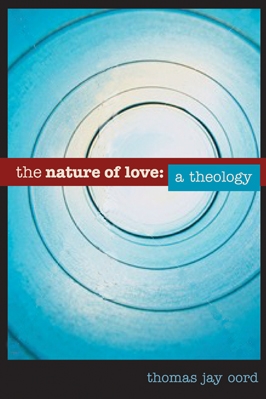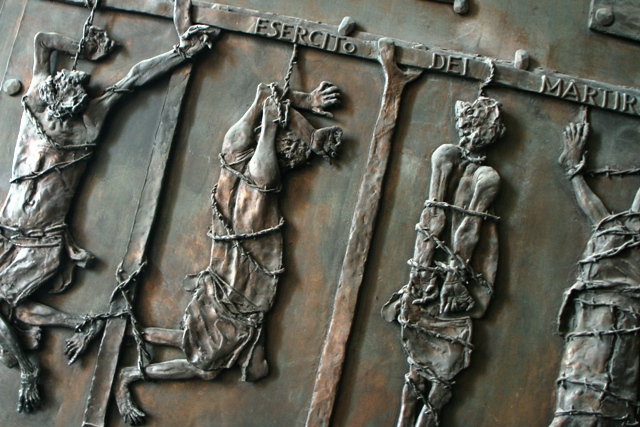Predestination, Hell, and Eternal Life
My recent book, The Nature of Love, concludes with comments about what theologians call “eschatology.” The eschatology I offer coheres with my Essential Kenosis theology, which I propose in the book’s last chapter.
Participatory Eschatology
Essential Kenosis theology calls us to place our hope for victory in God’s steadfast love. The Psalmist said, “The Lord delights in those…who put their hope in his unfailing love” (Ps. 147:11). The God who love us all is at work in the world, and God calls us to participate in that work.
Not only does the apostle Paul say, “in everything God works for good with those who love him” (Rom. 8:28). Paul also implores us to “work out our own salvation” (Phil. 2:12). Both verses say that God empowers and inspires us to seek God’s good purposes (ends).
Earlier in his letter to the Church in Rome, Paul says something profound about placing our hope in God’s love to overcome suffering. After acknowledging the suffering we face, Paul says “suffering produces endurance, and endurance produces character, and character produces hope, and hope does not disappoint us…” (Rom. 5:3b-5a).
The eschatological visions of many theologies would lead one to expect that the hope Paul mentions amounts to a guaranteed victory. However, Paul continues in that sentence by saying the purpose of hope is love! “And hope does not disappoint us,” he say, “because God’s love has been poured into our hearts through the Holy Spirit that has been given to us” (Rom. 5:5).
Essential Kenosis theology affirms Christian hope rests ultimately in the steadfast, kenotic, and noncoercive love of God. This hope has at least three dimensions. Our hope is God’s loving reign in this life, in the afterlife, and in the fulfillment of all things. Hope, in all of these dimensions, plays a crucial role in the Christian witness and well-placed confidence to live lives of love.
Eschatology and Eternal Life
Many Christians think of salvation as only pertaining to life after death. However, “eternal life” is a quality of salvific life that can begin now (Jn. 3:16). The “abundant life” that Jesus came to give can be enjoyed in this world (Jn. 10:10). The good life is possible, at least to some degree, in our present personal and social experience.
We should most often interpret the biblical phrase “eternal life” as referring to quality of life we can begin enjoying now rather than an infinitely extended quantity of life beyond death. The “eternal life” of John 3:16 is the new creation and abundant life Jesus presently provides and is also ours after death. For Paul tells us that in Christ we are new creations (2 Cor. 5:17). In his book, Surprised by Hope, N. T. Wright writes well about the importance of eternal life in the present.
 God’s kenotic love—not coercive power—also provides hope for a heavenly existence after death. Essential Kenosis theology agrees with Paul when he says “if for this life only we have hope in Christ, we are of all people most to be pitied” (1 Cor. 15:19-20). The resurrection of Jesus Christ testifies to us that through love, God subjects death and the enemies of life. And this resurrection is our best reason to expect a resurrected life beyond our present existence.
God’s kenotic love—not coercive power—also provides hope for a heavenly existence after death. Essential Kenosis theology agrees with Paul when he says “if for this life only we have hope in Christ, we are of all people most to be pitied” (1 Cor. 15:19-20). The resurrection of Jesus Christ testifies to us that through love, God subjects death and the enemies of life. And this resurrection is our best reason to expect a resurrected life beyond our present existence.
Predestination
Participatory eschatology governed by God’s kenotic love, differs from eschatologies that presuppose God has or can coerce in determining the eternal destiny of God’s creatures. It differs from eschatologies that claim God’s subjecting of enemies occurs only when God forsakes persuasive love and resorts to coercion.
In the name of love, Christians have largely rejected the view that God coercively predestines some to heaven and others to hell. Predestination presupposes a view of divine sovereignty incompatible with the view that a loving God necessarily provides freedom/agency to creatures. It is incompatible with the view that creatures freely respond well or poorly to God, and these responses play a role in our immediate and eternal destinies.
Instead of interpreting the few biblical passages that mention predestination as referring to God selecting some individuals for salvation and others for damnation, Essential Kenosis theology follows the typically Wesleyan interpretation of these passages. What has been pre-determined is the characteristics of the category of people who choose to respond to God’s love. We each can choose freely whether we will belong to the group of people who love or the group who does not.
Ultimately, the way predestination is typically interpreted makes God’s love arbitrary. Typical (and, I think, nonbiblical) views of predesintation consider God’s freedom to control more important than God’s love for all. A predestining God does not love steadfastly, because this God arbitrarily chooses some for salvation and others for damnation.
Universalism and Hell
Ironically, those who in the name of love affirm a universalism — based on the idea that God soveriegnly sends all to heaven — also presuppose that God exerts coercive power. Their view of God’s power is essentially the same as the predestinarian one. The God capable of controlling others entirely can unilaterally determine people to either heaven or hell.
The God who exercises all-controlling power to guarantee an all-victorious end-game scenario, however, is not a God who consistently enables creatures to choose freely. An essentially kenotic God neither predestines some to heaven and others to hell. But this God also does not unilaterally guarantee that all will be redeemed. God’s love neither predestines nor coerces creatures to either afterlife fate.
Essential Kenosis theology affirms the basic biblical view that our actions have consequences. On the one hand, our proper responses to God mean that we can be a blessing (1 Pet. 3:9). Proper responses promote overall well-being. On the other hand, the wages of our sin is death (Rm. 6:23).
While biblical writers mention hell infrequently compared with other theological subjects, Christians have largely affirmed some form of negative consequences for sin. What hell looks like, if it has a location, who experiences it—these are topics with widely divergent answers. The Bible provides clues to help formulate plausible answers without offering many specific details.
We should affirm the experience of hell, both as possibility in this life and the afterlife. We best describe hell as experiencing the negative consequences of choosing other than the loving best to which God calls. Hell does not mean, strictly speaking, separation from God. An omnipresent God never separates entirely from relational experience with others. Instead, hell is the opposite of what love promotes.
An eschatology whose God necessarily loves by giving freedom/agency to others affirms that God continues to love creatures in the afterlife. Even then, free creatures can freely choose to respond inappropriately to the God who calls them to live abundant life. Even then, creatures can choose hell.
Creatures who respond inappropriately to a loving God endure the negative consequences that come from choosing less than the loving best to which God calls. Failing to love—in both this life and the next—is to experience torment and gnashing teeth. Responding in love to the God who makes love possible is to experience a taste of heaven in this life and the fullness of heaven’s joy in the next.
Realistic Christian Hope
Essential Kenosis theology provides a conceptual framework for realistic Christian hope. Essential Kenosis affirms the hope of a final victory for all things at the end of history. It provides a basis for all creation to “be set free from its bondage to decay and obtain the freedom of the glory of the children of God” (Rm. 8:21). God’s almighty and unwavering love is the basis for such hope.
Essential Kenosis theology does not guarantee a final victory through coercion, however, because God cannot coerce. But participatory eschatology also does not present God as weak, uninvolved, or inactive. God’s love and power combine as the most commanding force in the universe—past, present, and future.
 The God whose very nature includes necessary love for the world—chesed—is a God who never gives up. The God who is almighty – the mightiest of all and exerting might upon all – is a God with immeasurable resources and authority.
The God whose very nature includes necessary love for the world—chesed—is a God who never gives up. The God who is almighty – the mightiest of all and exerting might upon all – is a God with immeasurable resources and authority.
In kenotic and noncoercive love, God gives to others and seeks their loving cooperative response. As creatures participate with God and appropriately respond to the call of love God gives, the loving reign of the Living Lord comes in fullness.
In this participatory eschatology, our hope is in God and our purpose—end—is to respond well to God’s call to promote overall well-being. Our hope is that God will ultimately win. With the Apostle Paul, “we hope for what we do not see.” Those who work with God and live in love “are called according to his purpose [end]” (Rom. 8:25, 28).
Ultimately, God’s powerful love is our hope — in this life and the next.

Comments
Very nicely stated…I like it a lot.
Dr. Oord,
I like very much what you have to say here (and the part in your book where you talk about this). Lately, I have been thinking quite a lot about the whole idea of salvation and how it is viewed. You mention that for many Christians salvation pertains only to life after death. It’s salvation from this world into a better one, if only we can hand on and make it. Eternal life is our ‘reward’ for making it through this life. Somehow, salvation and eternal life is all about what’s next and has little to do with what’s now.
Along these same lines, I’ve been thinking about how our view of salvation dramatically affects our view of what it means to be the church. Even the issues you talk about with eschatology determine what shape our image of church will take. It seems to me that a church shaped by the view that salvation pertains to life after death will look a lot different than a view that understands salvation pertains equally to life before death. Anyway, I’ve been thinking a bit about how these different views really do affect how we understand what the church is and does.
John
Tom,
You state that “An essentially kenotic God neither predestines some to heaven and others to hell. But this God also does not unilaterally guarantee that all will be redeemed.” I am struck by your careful language “does not unilaterally guarantee…” In your position, does God cooperatively guarantee that all will be redeemed? How is a person redeemed by an essentially kenotic God?
Tom, you wrote: “Essential Kenosis theology provides a conceptual framework for realistic Christian hope. Essential Kenosis affirms the hope of a final victory for all things at the end of history. It provides a basis for all creation to “be set free from its bondage to decay and obtain the freedom of the glory of the children of God” (Rm. 8:21). God’s almighty and unwavering love is the basis for such hope.”
What I don’t yet understand how the freedom from decay will come about. Isn’t creation cooperating yet? Or isn’t God working on it yet? It seems to be both answers would have to be yes, but I see so little change as yet. On what should my hope be founded?
Good blog post. Helpful in many ways. However, I have been thinking about the “eternal life” idea as a quality of life issue off and on for many years.
I remember first hearing that distinction from a traveling evangelist when I was in high school. It made sense then and carried a promise of satisfying some very pressing issues in my adolescent world. At the same time, it made my concerns and worries a very real part of God’s concerns for me in the present moment.
Yet, on the other hand, I have also felt the pain of unmet expectation. There are constant reminders in the life of faith, that the quality of life, eternal life, is not always easy, nor enjoyable. Suffering and waiting are the norm. From my initial encounter with eternal life as a quality of life there was a wide-eyed joy. Now there is a more (mature?) realization that eternal life is not instant gratification.
That said, since my first reading of Moltmann in 1982, I have seen the trend in myself to draw a line between this life, and the life to come, that may not actually be there. Surely there is death, or else there is now resurrection. I’m not a Platonist on this. However, there is a transcendent connection or participation even now in the life to come. The promise of eternal life then seems to connect me to “heaven” and the purposes of God’s unfailing love, even now.
I could go on, but I have a sermon to finish.
Last concern, if the kingdom of God as preached by Jesus is to be a prevalent concern of the church, and shaping our ecclesiology, shouldn’t the concept of eternal life shape it as well? Not just in our preaching but in understanding the nature and purpose of the church?
I’m still thinking on this….
Dr. Oord,
Essentially, you have expressed what I believe about eschatology. Keep up the fine work. Do you know where one can go to read up on the Wesleyan view of predestination? (a sermon from John Wesley, etc.?)
Dr. Oord, A good post. I admit I still have trouble with though—I wonder why a loving God must necessarily be noncoercive? Your own definition of love involves acting intentionally for the subject’s well-being. A parent would forcibly stop their child from stepping in front of a speeding car, and would do so from love. Given that the stakes are so much higher, it still seems as though a perfectly loving God would do all in his power to prevent us from stepping in front of the car, as it were.
Another question raised for me by eschatology is how good is good enough? Even the most (and perhaps especially the most) devout would admit that they do not love as they should. And it seems even the worst people must love at some times. So where is the cut off? Is conscious acknowledgment of God (or, a step further, Christ) necessary, and if so, doesn’t that too raise an awful lot of problems for our conception of a loving God?
Katy,
Thanks for your comments! A great deal comes down on what it means to be coercive. I address this specifically in my new book, The Nature of Love. May I recommend it to you?
In terms of eschatology, I want to say that we can respond both consciously and unconsciously to God’s calling. And sometimes those who reject God outright are really rejecting a bad image of God. God—who sees our hearts and knows all it is possible to know—can judge adequately.
Hoping this helps in some way…
Tom
Thanks for the response—I will indeed find myself a copy of your book.
I think part of the universal love belief that many misunderstand is that ‘hell’ as defined in modern Christianity is not the same sheol, gehenna, hades that is discussed in the Bible. I know universalists who do believe in ‘a’ hell but it’s not what others think it is.
I found it interesting when you quoted, “Many Christians think of salvation as only pertaining to life after death. However, “eternal life” is a quality of salvific life that can begin now.” I never thought receiving salvation as something you could live out on earth…it only occurred to me that salvation was received in heaven.
You continue on to say, “We should most often interpret the biblical phrase “eternal life” as referring to quality of life we can begin enjoying now rather than an infinitely extended quantity of life beyond death.” I would have to agree with this statement in that being saved means we are able to take it in while we are alive as well as in heaven.
i also highly agree with Wesley’s idea that humans have the free-will and are able to choose salvation or not. As he puts it, “What has been pre-determined is the characteristics of the category of people who choose to respond to God’s love. We each can choose freely whether we will belong to the group of people who love or the group who does not.” We can control where we go when we die by choosing God over ourselves…and we can choose how to live our lives right now.
God is always there for us and He never leaves our sides. It is ultimately up to us to decide whether or not we want to follow and submit our lives to Him.
The Hebrew culture had a word that described God’s love more appropriately than the English word “love.” Affection, friendship, loyalty, desire, and attachment are all synonymous to the English word for love, but unfortunately they do not encompass the word that they are typically translated from in the Hebrew Bible. The word that is not fully translated into modern English culture is “hesed.” The Hebrew word hesed has a much greater and more complex connotation than is transmitted through the English language. Hesed is essentially kindness, dealing loyally, steadfast love, and devotion or faithfulness, but it is more than these words individually. Hesed is a gift from God to an undeserving creation that cannot return the same compassion.
This is the kind of love that God expresses and is his character. Humanity after receiving and accepting “hesed” is called to be righteous through “do justice, hesed, and walk… with God” as stated in the book of Micah (6:8). It was in the context of this word that what matter most was this life and their righteous relationship with God not the afterlife. Therefore, the Christian culture should probably have a similar outlook in living with God.
Sakenfield, Katherine. Love: Old Testament: hesed. Anchor Bible Dictionary.
I would recommend that all interested in what the Bible teaches on the afterlife read the following book (our friend the late Clark Pinnock wrote the forward to the book): http://www.friendsofsabbath.org/Further_Research/Bacchiocchis Research/Immortality or Resurrection.pdf
Further resources may be found here: http://en.wikipedia.org/wiki/Christian_conditionalism#External_links
Tom,
There is certainly a lot of information to digest in this post. In a very real sense, I believe a measure of universalist thinking has some value. I personally believe that God is seeking to save all (everyone and everything), though God does not force that to happen. Thankfully God freely gives grace because God is compelled to love. You are absolutely right when you suggest that any form of predestination, including Universalism, goes against the freedom God is giving people. Ultimately love provides the ability to freely choose. If we do not have the freedom to choose than any real measure of hope has been taken from me.
I think the point you make about what we experience here on this earth cannot be understated. We can be in and bring in hell here on earth. The same is also wonderfully true of heaven. An eschatology that does not see that fails the witness in scripture.
When I have both the ability to freely respond and choose God’s love, and what I choose has effects for the present as well as the future, the human experience is satisfied. Any person can find hope and meaning when they are producing a future that matters.
I once heard that the Jewish philosophical understanding of heaven is wherever God is dwelling and love is enacted. The idea for hell was described as wherever we are isolated from each other and God. These realities exist in people’s hearts as well as in their actions. They seemingly would extend to the afterlife as well – for what we are in this life we will be in the next. The rich man and Lazarus from Luke 15:19-31 makes sense of that outlook. The rich man was isolated by his own choices in this life and the next.
This type of eschatological thinking puts a new emphasis on what Christians are doing everyday. I believe if more people thought like this, perhaps we could truly be ushering a slice of the Kingdom of God where the whole world would want to stop and take notice.